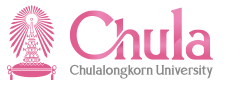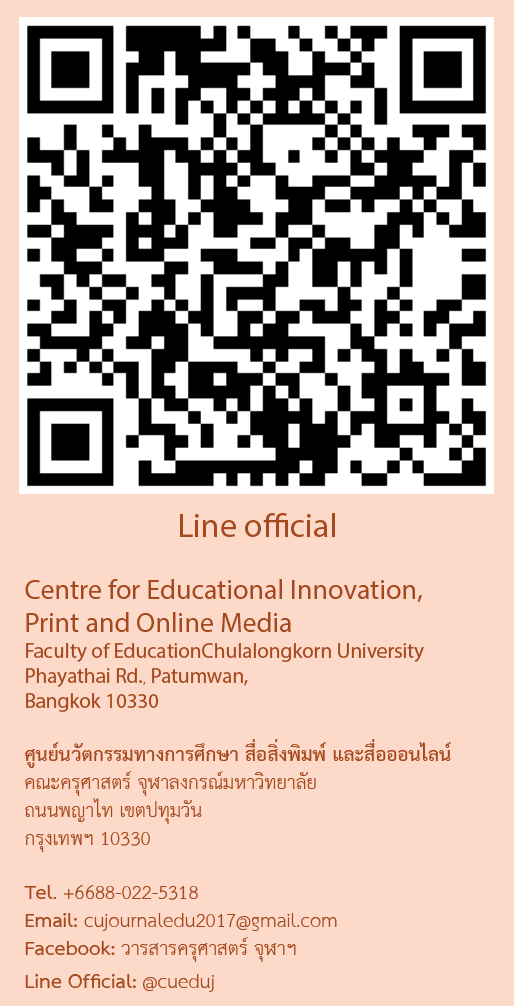Abstract
การวิจัยนี้มีวัตถุประสงค์เพื่อพัฒนากระบวนการเรียนรู้นอกระบบโรงเรียนแบบมีส่วนร่วมโดยใช้ปัญหาเป็นฐานเพื่อเสริมสร้างความสามารถด้านการจัดการความขัดแย้งเชิงสมานฉันท์สำหรับเยาวชนในชุมชนแออัด มีการดำเนินการวิจัย 4 ขั้นตอน ได้แก่ 1) การสำรวจความต้องการของเยาวชนคู่ขัดแย้งและผู้มีส่วนเกี่ยวข้อง และกำหนดกิจกรรมในการแก้ไขปัญหา 2) การดำเนินการตามกิจกรรมที่กำหนดไว้ 3) การตรวจสอบผลการแก้ไขปัญหา และ 4) การถอดบทเรียนเกี่ยวกับสิ่งที่ได้เรียนรู้ ผู้มีส่วนร่วมในงานวิจัยนี้ คือ เยาวชนคู่ขัดแย้ง 1 คู่ ผู้มีส่วนเกี่ยวข้องกับความขัดแย้ง 9 ท่าน และผู้นำชุมชน 6 ท่าน พื้นที่ในการศึกษาวิจัย คือ ชุมชนวัดโพธิ์เรียงและชุมชมวัดอัมพวา กรุงเทพมหานคร
ผลการวิจัย พบว่า เยาวชนคู่ขัดแย้งได้เรียนรู้เพื่อจัดการปัญหาของตนเอง โดยร่วมกับผู้มีส่วนเกี่ยวข้องในการคิด วางแผน ดำเนินการ และสรุปผล แล้วได้เปลี่ยนแปลงตนเอง ความขัดแย้งจึงระงับลงในที่สุด เมื่อสังเคราะห์กระบวนการ พบว่า อยู่บนความเชื่อพื้นฐาน คือ เยาวชนในชุมชนแออัดมีศักยภาพในการเรียนรู้เพื่อจัดการปัญหาที่เกิดขึ้นด้วยตนเอง ประกอบด้วย 5 ขั้นตอน ได้แก่ 1) การย้อนคิดย้อนทบทวน 2) การวางแผนอย่างสร้างสรรค์ 3) การสื่อสารอย่างเข้าใจ 4) การร่วมมือเพื่อเปลี่ยนแปลง และ 5) การสรุปสิ่งที่ได้จากการเรียนรู้ โดยมีปัจจัยในการนำ กระบวนการไปใช้ ได้แก่ ความพร้อมด้านผู้สนับสนุนสถานที่ อุปกรณ์ และเวลา
Publisher
Faculty of Education, Chulalongkorn University
DOI
10.58837/CHULA.EDUCU.48.3.24
First Page
405
Last Page
425
Recommended Citation
ธิรศริโชติ, อัจฉรียา and สุปัญโญ, วีรฉัตร์
(2020)
"การพัฒนากระบวนการเรียนรู้นอกระบบโรงเรียนแบบมีส่วนร่วมโดยใช้ปัญหาเป็นฐานเพื่อเสริมสร้างความสามารถด้านการจัดการความขัดแย้งเชิงสมานฉันท์สำหรับเยาวชนในชุมชนแออัด,"
Journal of Education Studies: Vol. 48:
Iss.
3, Article 24.
DOI: 10.58837/CHULA.EDUCU.48.3.24
Available at:
https://digital.car.chula.ac.th/educujournal/vol48/iss3/24


